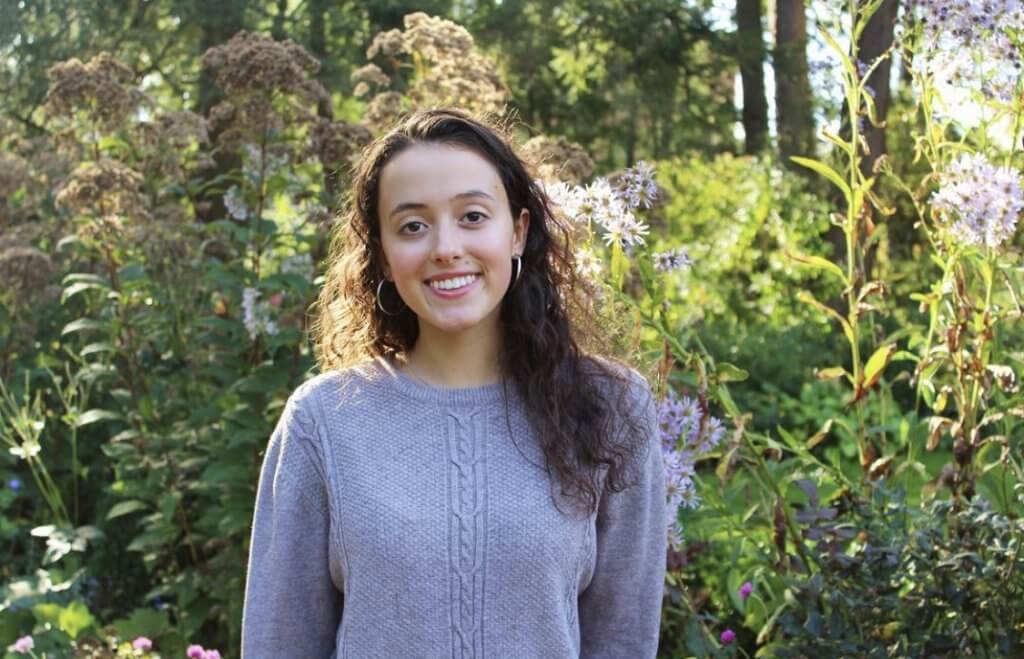Being a trailblazer is exciting and something to be proud of, but it isn’t always easy.
Just ask Andrea Reino, a senior at Princeton University and the daughter of Spanish immigrants. Like many first-generation Americans, she’s the first in her family to go to college.

Currently, Reino’s father works as a landscaper and her mother is a school nurse at the elementary school near their family home in Westchester, New York.
But even though neither of her parents has a four-year degree, Reino always knew her education wouldn’t stop after high school.
“In the town that I grew up in, college is pretty much expected,” said Reino. “So, I grew up thinking about college, and my parents always encouraged me to go.”
But that didn’t make it easy for her once she stepped foot on Princeton’s campus.
“There was a really steep learning curve for me, socially and academically as well, just because I really had no idea what I was stepping into,” Reino said.
Most of her high school and college friends’ parents went to college; some of them even have doctoral degrees. So, before going to college, her friends all knew what to expect. And if they needed any help along the way, their parents could give them advice based on personal experience.
“My parents couldn’t,” Reino said.
“My parents were extremely involved throughout my entire college process, and they were with me every step of the way,” she added. “But they couldn’t offer anything other than support. They couldn’t advise me based on their past experiences because they didn’t have any. So, I didn’t feel 100-percent prepared because I didn’t have that support.”
Reino is not alone. Nearly a third of college students in the United States are first-generation. And they face many added stressors attached to the college experience — from having to navigate applying for financial aid on their own to unlocking the unwritten rules of succeeding in college.
Additionally, a high percentage of first-generation students carry the added weight of other identities, such as being low-income, minority or LGBTQ, as well. And that can make things much harder.
“A lot of people think first-generation students don’t struggle as much as we do,” Hassan Mustefa, a first-generation student at the University of Colorado – Denver, told 9News. “We’re not able to just go to class and go home … we go to class and we have to go home and take care of family. We work full-time jobs.”
Many first-generation students also experience social isolation, which is detrimental to mental health.
Tanner Bonner, a sophomore at MIT, is one of these students. In addition to being the first in his family to go to college, Bonner is low-income and gay.
“I’m not the average Joe here at MIT,” Bonner told WGBH. “I think about it every day.”
Bonner, who grew up in Dearborn Heights, Michigan, struggles to feel at home at school, and that has increased his anxiety.
Overall, first-generation students are at higher risk of developing mental health problems than students whose parents went to college. And they’re less likely to graduate on time or at all — just 27 percent of first-generation students graduate within four years.
Helping first-generation students succeed
But as more studies and stories have been published highlighting the struggles first-generation students go through, schools have increased their efforts and independent groups have emerged to try to help these students navigate college and alleviate some of their stressors.
At this point, nearly every four-year college and university throughout the United States has created support services to guide and encourage first-generation students. And while there are still improvements to be made, many of these programs have proven to be successful.
Sometimes, all it takes is helping students find a community of peers who share their experiences. That’s what helped Reino.
Shortly after arriving at Princeton, Reino joined several mentorship groups on campus and was able to connect with students older than her who went through similar experiences. And so after her freshman year, Reino decided to reciprocate and help other students by mentoring them.
Additionally, Reino has a twin sister at Boston College, who she could confide in.
“She was experiencing the same thing that I was at a different school,” Reino said. “And it was really helpful to be able to talk to her everyday or whenever needed to see what she was experiencing. She was kind of my biggest supporter, other than my parents, throughout that process.”
But not everyone has a twin sister to talk to when they’re down or need advice. And more than anything, first-generation students need community. Conversing with others who are in a similar position helps first-generation college students understand that their challenges are legitimate and that they aren’t the only ones going through them.
That theme — that no one is alone — is portrayed at the annual IvyG Conference for first-generation students from across the Ivy League and peer schools. Each year, students gather at the conference to empower each other and lend any advice they have.
Since the inaugural IvyG conference in 2015, schools have come a long way in recognizing the struggles and needs of their first-generation students.
Now, there is even a national day to celebrate first-generation students. On November 8, schools across the United States bring speakers to campus, kick off new mentoring programs and even distribute “first-gen swag.”
But, without question, challenges faced by first-generation students across the nation are still overlooked on a daily basis. So, organizations like the Center For First-Generation Student Success — the same group that created First-Generation Celebration Day — continue to conduct research and advance initiatives to help colleges and universities make their first-generation students feel at home.
Recently, the organization partnered with the Council for Opportunity in Education to launch the First Forward initiative, which recognized 80 colleges and universities for their commitment to helping first-generation students succeed. Nine of those schools, including El Camino College, Kansas State University, North Central College, Northern Arizona University, UCLA, University of Florida, University of North Carolina and the University of Texas at San Antonio, were named “advisors” that will mentor other institutions throughout the United States on how to advance outcomes for first-generation students most effectively.
One initiative that stands out from the rest and could easily be implemented at other colleges and universities is Cardinal First, a flagship program of North Central College, where nearly 40 percent of students are first-generation. The program creates a community among its first-generation students, faculty and staff and offers students first-hand assistance with networking, life skills, scholarships and more. Eighty-one percent of first-generation students who complete this program are graduating within four years — well above the national average.



